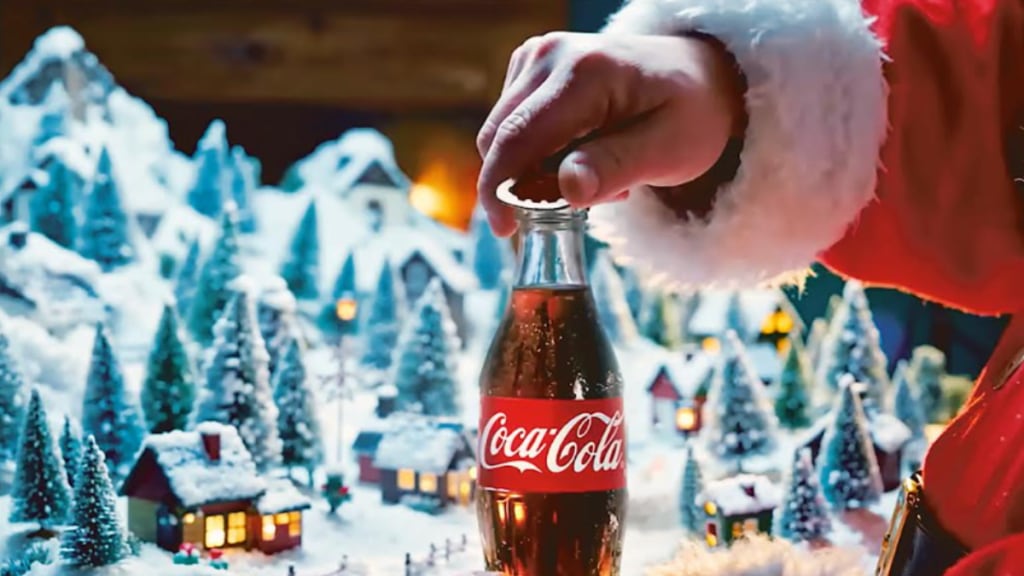Brands have a long history of jumping on to the next-big-thing bandwagon.
Beverage major Coca-Cola seems to have fallen into the same trap with its recently released campaign for the upcoming holiday season. Its Christmas campaign this time is a recreation of the iconic 1995 ad film, ‘Holidays Are Coming’. The ad features the usual holiday characters right from Santa Claus to the trademark Coke truck that drives past a bevy of creatures like polar bears and penguins before making its way to consumers.
Social media criticism has been relentless since the ad’s release a week ago, with savage comments like “the best ad Pepsi never paid for” among many others. Coca-Cola has been forced to defend its use of technology, with global vice-president and head of generative AI Pratik Thakar asserting there’s no retreating from AI. “The genie’s out of the bottle,” he told a gathering in Atlanta. “You either lead with it, or you keep crying about it.”
So what’s the furore all about?
The criticism hinges on the use of technology with critics saying AI wasn’t treated as part of the process but a layer sprinkled on top.
Those who have followed Coca-Cola advertising say the campaign should have reflected the warmth and human connections consumers associate with the holidays. Over the years, Coca-Cola has secured its position as a trendsetter in advertising. This time around the brand has turned into a trend chaser, with an ad that feels algorithmic rather than aligned with the brand narrative, says Soumabha Nandi, EVP for creative strategy & growth, Social Panga.
According to Rajiv Dingra, founder and CEO, ReBid, the brand’s AI film missed the emotional mark because it treated AI as the storyteller instead of a tool that empowers human storytelling. “AI can scale creativity, but it can’t substitute sentiment. The film looks polished but feels hollow because there’s no lived emotion behind it. Coca-Cola could have used AI to augment the creative process — perhaps to reimagine holiday memories, or remix fan-submitted stories — but the final narrative still needed to be anchored in humanity,” observes Dingra.
For a brand that has prided itself over the years in creating ‘real magic’, the commercial didn’t stay true to its defined promise, says Naresh Gupta, co-founder and CSO at Bang In The Middle. He notes that while the ad is a great showcase of generative AI, it barely offers the charm seen typically in Coke ads. “When technology overtakes brand values and brand purpose, what you get is a commercial that doesn’t move the consumers’ hearts and minds,” he adds.
Marketing lessons
Of course, many experts feel the criticism is not entirely justified. For one, Rashi Ray, director at Response India says that the brand’s use of AI was clever and even felt endearing. Pointing out that Coke’s latest campaign has broken new ground, she says, “Every time a brand experiments with something new, whether it’s AI, design or simply a story told differently, it walks that fragile line between curiosity and acceptance. That’s where real brand growth happens.” That said, brands looking to make a mark with AI would do well to pick up some cues from others that have used it to win consumer love.
Take travel platform Agoda’s campaign featuring Ayushmann Khurrana that leveraged AI to create hundreds of versions customised for different cities and languages. “Technology can help scale storytelling, but it can’t replicate humanity. If your legacy is built on human connection, don’t sacrifice it for novelty. Speed and efficiency mean nothing if the audience doesn’t feel something,” says Neelesh Pednekar, co-founder & head of digital media at Social Pill. In the case of Coke, he says, a hybrid approach with a mix of real human performances and AI-assisted visual design would have worked better.
Or take Nike’s Never Done Evolving campaign that features tennis star Serena Williams play against her younger self.
Short lesson: Technology doesn’t fix misalignment — it amplifies it. The safeguard here is strategy. So green-light projects only when they address a specific concern, “not because you feel you need an AI initiative”, says a branding expert who has worked in the FMCG sector.
